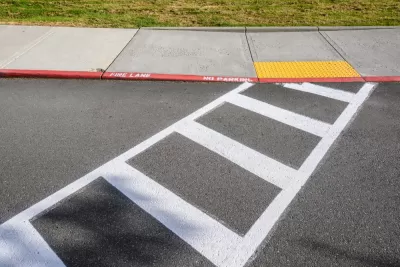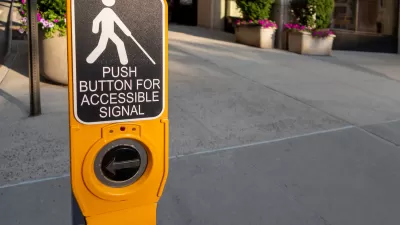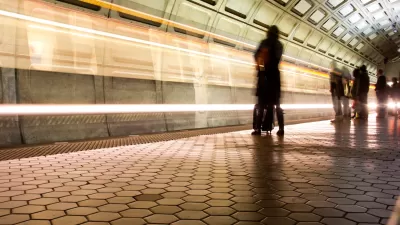Disability rights advocates won a settlement that directs the city to improve accessibility on its public roads over the next 15 years.

The city of Philadelphia will build or repair 10,000 curb cuts to comply with the settlement of a lawsuit filed by disability rights advocates, reports Sophia Schmidt for WHYY. If the settlement agreement is approved by a federal judge, the city will make the required improvements over the next 15 years.
“[The advocates] described a city filled with barriers, including uneven, crumbling sidewalks, improper snow removal, construction without safe alternative routes, illegally parked cars, and ‘fake curb cuts,’ where concrete is just poured to fill the space between the curb and the street,” Schmidt writes. “According to the complaint filed in 2019, several of the plaintiffs had gotten hurt tripping over hazards or falling out of wheelchairs, just trying to get around the city.”
The settlement, which is focused on curb cuts, will not apply to sidewalks or sidewalk obstructions, which pose another challenge to people with disabilities trying to navigate the city.
Although the Americans with Disabilities Act (ADA) is more than three decades old, many public spaces and streets still lack universal accessibility. Meanwhile, private spaces fare no better. As Steve Wright noted in 2020, “In fact, fewer than 1% of single-family homes in America are move-in ready for a wheelchair user, a staggering fact considering that over half of Americans live in single-family houses.”
In 2021, the federal government announced it would enforce the Public Right-of-Way Accessibility Guidelines (PROWAG) as federal standards, which could move the needle on how developers and planners prioritize accessibility. But so far, it has taken lawsuits—in cities such as Atlanta, Baltimore, and Seattle—to gain significant improvements from local governments.
FULL STORY: Philly will build or fix 10,000 curb cuts under settlement with disabled residents

Maui's Vacation Rental Debate Turns Ugly
Verbal attacks, misinformation campaigns and fistfights plague a high-stakes debate to convert thousands of vacation rentals into long-term housing.

Planetizen Federal Action Tracker
A weekly monitor of how Trump’s orders and actions are impacting planners and planning in America.

In Urban Planning, AI Prompting Could be the New Design Thinking
Creativity has long been key to great urban design. What if we see AI as our new creative partner?

King County Supportive Housing Program Offers Hope for Unhoused Residents
The county is taking a ‘Housing First’ approach that prioritizes getting people into housing, then offering wraparound supportive services.

Researchers Use AI to Get Clearer Picture of US Housing
Analysts are using artificial intelligence to supercharge their research by allowing them to comb through data faster. Though these AI tools can be error prone, they save time and housing researchers are optimistic about the future.

Making Shared Micromobility More Inclusive
Cities and shared mobility system operators can do more to include people with disabilities in planning and operations, per a new report.
Urban Design for Planners 1: Software Tools
This six-course series explores essential urban design concepts using open source software and equips planners with the tools they need to participate fully in the urban design process.
Planning for Universal Design
Learn the tools for implementing Universal Design in planning regulations.
planning NEXT
Appalachian Highlands Housing Partners
Mpact (founded as Rail~Volution)
City of Camden Redevelopment Agency
City of Astoria
City of Portland
City of Laramie





























